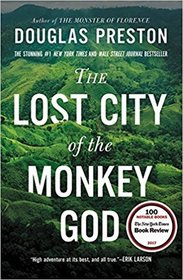Douglas Preston is a favorite of mine. I went into the book expecting a good read about an expedition into the unknown and some history into indigenous culture. What I got was much, much more!
Preston does an incredible job of presenting dry subjects such as Central American politics, archeologic processes, epidemiology, etc. in a way that makes the book a real page-turner.
I will admit the first 60 pages or so were slow, but after than I was completely engaged.
Key things I walked away with:
1. Great civilizations fail for the same reasons.
2. Humans have an amazing capacity to protect natural and historical wonders, but, unfortunately, more of us just want to exploit whose wonders.
3. In a battle between nature and humans, nature wins.
4. One of the greatest dangers to us has been around since dinosaurs walked the earth and little is being done to control it.
5. Never under estimate the power of a dream.
Preston does an incredible job of presenting dry subjects such as Central American politics, archeologic processes, epidemiology, etc. in a way that makes the book a real page-turner.
I will admit the first 60 pages or so were slow, but after than I was completely engaged.
Key things I walked away with:
1. Great civilizations fail for the same reasons.
2. Humans have an amazing capacity to protect natural and historical wonders, but, unfortunately, more of us just want to exploit whose wonders.
3. In a battle between nature and humans, nature wins.
4. One of the greatest dangers to us has been around since dinosaurs walked the earth and little is being done to control it.
5. Never under estimate the power of a dream.
This true story is about searching for the 'lost city', the 'white city', the 'city of the monkey god' in Honduras. The author is astute in describing the quick-mud, torrential rains, disease-carrying insects, jaguars, and incredible snakes of the area.
I was a bit disappointed by the brevity of the historical adventure. However, when half of the team became ill, it seemed fair to go into some depth to explain the danger and consequences of getting their disease(s).
However, I was really surprised when the book moved into a treatise about pan-epidemics and the collapse of civilizations.
I was a bit disappointed by the brevity of the historical adventure. However, when half of the team became ill, it seemed fair to go into some depth to explain the danger and consequences of getting their disease(s).
However, I was really surprised when the book moved into a treatise about pan-epidemics and the collapse of civilizations.




